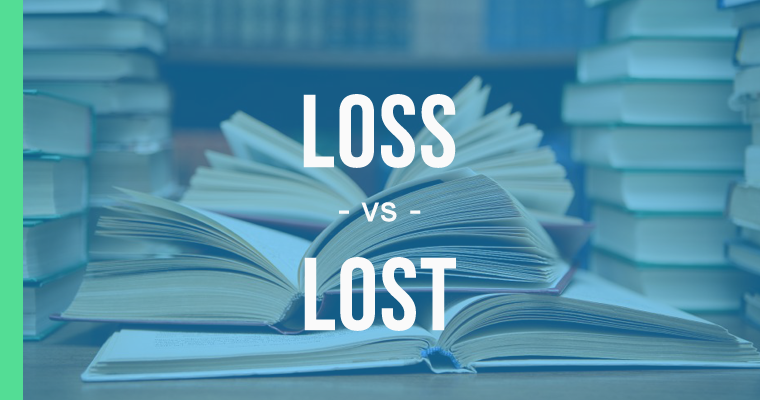Loss or Lost – What’s the Gist?
- Loss is a noun.
- Lost is a verb.
Continue reading for a more full discussion.

How to Use Loss
Loss definition: The word loss functions as a noun. A loss is the act or process of losing.
At the end of most sports games, one of the competing teams will have a loss on their record.
- Motivated by last year’s loss, the team quickly swept the finals this year.
In business, a loss has a slightly different meaning, where it refers to an amount of money lost by a business or organization. If a business sells something for less than it paid for it, for example, it sold those goods at a loss.
- I can’t take a loss on this product, but I can sell it to you at my cost.
How to Use Lost
Lost definition: The word lost functions as a verb. More specifically, it is the past tense and past participle of the word to lose. To lose has a few common meanings.
If you misplace something, you might say that you lost it.
- I seem to have lost my keys. Can you help me find them?
Lost also applies to sporting and athletic competitions.
- The Cavaliers lost in the NBA Finals.
It can also be used in business contexts.
- The business has lost money for each of the last three quarters.
In addition to its use as a verb, lost can function as an adjective.
For example:
- I am looking for my lost dog.
In this example, lost is describing the dog and is functioning as an adjective.
Outside Examples of Lost vs. Loss
- This is the first time the Golden Knights have lost back-to-back games in the playoffs. –The Washington Post
- He was indeed frustrated at another loss, this one an 8-3 defeat to the Los Angeles Dodgers. But his dismay was pointed inward, at himself. –The New York Times
Phrases That Use Lost and Loss
There are quite of few different phrases that use these words, primarily lost. Here are just a few.
At a loss: to be puzzled, confused of speechless.
- He was at a loss for words when he heard the news.
A lost cause: to be hopeless.
- Fixing that car is a lost cause. You need to buy a new one.
Get lost: informal way to tell someone to leave.
- Why don’t you get lost!
Make up for lost time: to do something most often to compensate for not doing it earlier.
- I never had nice clothes growing up, so I need to make up for lost time.
How to Remember These Words
These words are easy enough to distinguish once you know their function in the sentence.
- Loss functions as a noun.
- Lost functions as a verb.
Loss rhymes with another noun, boss, which you can use to keep these words straight in your head.
Article Summary
Is lost or loss correct? Both of these words are correct in their own context, but each serves a specific function.
- Lost and loss both have to do with losing.
- Lost is a verb.
- Loss is a noun.
These words are not interchangeable, so it’s important to know when to use each.
